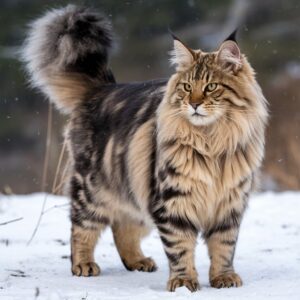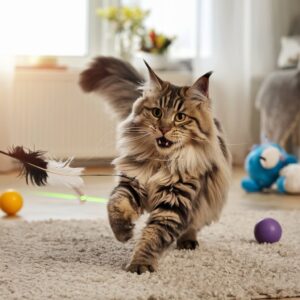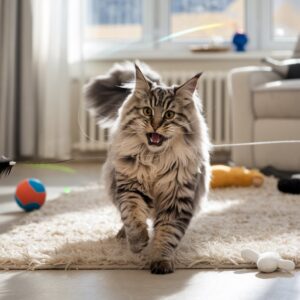Ultimate Guide to Caring for Your Maine Coon Cat: Tips and Best Practices
The magnificent Maine Coon cat, renowned for its impressive size and charming facial features, has captivated the hearts of cat lovers for generations. Hailing from the frigid and picturesque landscapes of Maine, these cats are naturally designed to withstand cold climates, showcasing thick, bushy tails that resemble cozy winter scarves, tufted ears that enhance their striking appearance, and a luxurious coat available in an astonishing variety of colors. Their formidable physiques, characterized by large, muscular paws, serve a practical purpose, essential for their survival in harsh environments, allowing them to navigate snowy terrains with ease. Like small lions, they are perfectly adapted to thrive in chilly conditions, making them not just stunning companions but also resilient survivors.
The personality of Maine Coons is nothing short of enchanting, effortlessly drawing people into their orbit. Their social nature often evokes comparisons to dogs, leading many to comment on their dog-like qualities. This observation is not merely casual; it highlights their genuine loyalty and affectionate disposition, which distinctly sets them apart from other feline breeds. When a Maine Coon chooses to form a bond with you, it’s akin to winning the lottery in the realm of pet companionship! Beyond their affectionate nature, Maine Coons are remarkably intelligent and playful creatures. Watching a Maine Coon navigate a puzzle toy is a delightful experience, reminiscent of a strategic chess match, showcasing their ability to strategize and solve challenges in a captivating manner.
Often lovingly dubbed “gentle giants,” Maine Coons exhibit a calm and serene demeanor that can easily mislead you into underestimating their innate playful spirit. They are natural adventurers at heart, embodying the playful energy of children with an almost infinite supply of enthusiasm. It’s not uncommon to catch them gazing at you with their insightful, almost enigmatic eyes before they spring into action, playfully knocking over items in their path like little furry wrecking balls. Their vocalizations are also unique; they often prefer chirps and trills over standard meows, as if engaging in an ongoing conversation, sharing their thoughts on everything from their latest meal to the day’s weather, creating a rich tapestry of communication.
With their combination of robust physical features, sharp intellect, and captivating personalities, Maine Coons truly represent an exceptional breed in the world of felines. It’s no surprise that they are highly regarded among cat enthusiasts and lovers alike. They are akin to rare gems, each possessing its own personality traits and quirks, always managing to surprise you just when you feel you have them completely figured out.
Essential Insights Every Maine Coon Cat Owner Should Know
- Maine Coon cats are known for their sizable stature, friendly demeanor, and impressive intelligence, making them ideal companions for families seeking a loving and loyal pet.
- A nutritious diet rich in high-quality protein, coupled with sufficient hydration, is critical for sustaining the health and vitality of Maine Coon cats.
- Establishing regular grooming routines, including thorough brushing and nail trimming, is vital for maintaining the Maine Coon’s thick, water-repellent coat in pristine condition.
- As active and playful creatures, Maine Coons thrive when provided with an abundance of toys and opportunities for physical activity, which are essential for their overall well-being.
- Routine veterinary check-ups and vaccinations are crucial for monitoring the health of Maine Coon cats, especially since they may be predisposed to specific genetic health conditions.
 Understanding the Nutritional Needs and Dietary Essentials for Maine Coon Cats
Understanding the Nutritional Needs and Dietary Essentials for Maine Coon Cats
Feeding a Maine Coon cat can be a nuanced yet rewarding task; it requires careful consideration of their unique nutritional needs based on a variety of factors, including their impressive size—after all, they are among the largest domestic cat breeds—age, and activity levels. Maine Coons typically have higher energy expenditures compared to standard house cats, which means they require a more substantial food intake to support their larger bodies and active lifestyles. However, it’s not just about quantity; the quality of their diet is of utmost importance. A well-balanced meal that emphasizes high-quality protein sources is vital for maintaining their muscle mass and overall health, ensuring they thrive as healthy companions.
Many experienced cat owners and veterinarians advocate for diets rich in animal-based proteins, such as chicken, turkey, and fish. These protein sources provide essential amino acids that not only fuel their energy but also support the maintenance of their substantial muscle structure. Do not overlook the significance of fats in their diet, either! Healthy fats contribute to the luster and beauty of a Maine Coon’s magnificent coat, keeping it shiny and healthy, much like a model’s hair following a professional conditioning treatment. Incorporating these elements into their meals is crucial for their overall well-being.
Hydration also plays a critical role in a Maine Coon’s diet. These cats are particularly susceptible to urinary tract issues, making adequate water intake essential for their health. Always ensure your Maine Coon has easy access to fresh, clean water throughout the day. Some owners have found success in incorporating wet food into their cat’s diet, as this not only adds moisture but also diversifies their meals, preventing boredom with repetitive kibble. Wet food can serve as an exciting treat that keeps their palate engaged, while also aiding in hydration and overall health.
For those dedicated to optimizing their Maine Coon’s health, consulting with a veterinarian to establish a tailored feeding plan can be immensely beneficial. Vets can provide personalized recommendations based on your cat’s specific needs, including age, weight, and any existing health concerns. Regularly monitoring their weight and adjusting their diet as they age or increase in activity level is crucial in preventing obesity, which can be a common issue for these large felines if not managed properly. A proactive approach to their diet will ensure a long, healthy life.
Expert Tips for Comprehensive Grooming and Coat Care for Maine Coon Cats
Maintaining the stunning coat of a Maine Coon cat requires dedicated grooming practices that ensure their fur remains in excellent condition while minimizing shedding and reducing the occurrence of hairballs, particularly for those long-haired individuals. One effective strategy is to increase brushing frequency during shedding seasons, which typically occur in the spring and autumn. However, grooming goes beyond simply brushing their fur; it’s also essential to attend to their eyes, ears, and dental health to promote their overall well-being.
Regularly cleaning their large ears with a veterinarian-recommended solution can help prevent the build-up of wax and debris, which could lead to more serious health issues if neglected. Pay close attention to any unusual discharge from their eyes; signs of redness or excessive tearing may require further investigation from a veterinary professional. Additionally, maintaining excellent dental hygiene is crucial; incorporating regular tooth-brushing into your Maine Coon’s routine, along with providing dental treats, can significantly reduce the risk of periodontal disease, ensuring they stay healthy and happy.
Engaging in regular grooming sessions not only contributes to your Maine Coon’s health but also provides a wonderful opportunity for bonding. It’s a chance to spend quality time together, enhancing your pet’s comfort and overall well-being while fostering a deeper connection. This shared experience can strengthen your relationship, making grooming a rewarding and enjoyable activity for both you and your Maine Coon.
 Maximizing Exercise and Playtime for Happy Maine Coon Cats
Maximizing Exercise and Playtime for Happy Maine Coon Cats
Maine Coon cats thrive on regular exercise due to their energetic disposition and playful nature. Engaging in physical activity offers numerous benefits that contribute to their overall well-being, including weight management and mental stimulation, which can help reduce the likelihood of behavioral issues stemming from boredom. Utilizing feather wands or laser pointers can effectively keep these lively felines entertained and physically active, ensuring they remain engaged and happy while also providing them with the exercise they need.
Given their natural curiosity and love for exploration, it’s essential to provide Maine Coons with climbing structures such as tall cat trees. These additions to their living environment not only satisfy their climbing instincts but also encourage active play. Establishing a routine for dedicated playtime each day can significantly enhance their happiness and well-being. Maine Coons particularly enjoy games that challenge their intellect, such as puzzle feeders or treat-dispensing toys that require them to think critically and solve problems, providing both mental stimulation and physical challenges.
Regular exercise not only helps maintain their physical shape but also strengthens the bond between you and your Maine Coon through shared activities. Observing their preferences during playtime can assist in tailoring activities to suit their individual interests; some may prefer chasing toys, while others might enjoy interactive games that involve their human companions. By creating an enriched environment filled with a variety of opportunities for play and exercise, you’re contributing to your Maine Coon’s overall happiness and mental stimulation, ensuring they lead fulfilling lives.
Ensuring Optimal Health Care with Routine Veterinary Visits for Maine Coon Cats
To ensure the long-term health and vitality of your Maine Coon cat, it’s vital to prioritize preventative care and maintain regular veterinary appointments. Like all breeds, Maine Coons can be susceptible to certain hereditary conditions, including hypertrophic cardiomyopathy (HCM), hip dysplasia, and spinal muscular atrophy (SMA). Scheduling regular veterinary check-ups can facilitate the early detection of potential health issues, allowing for timely intervention and effective management strategies.
In addition to routine examinations, preventative measures such as vaccinations, parasite control, and regular blood screenings play a crucial role in maintaining your Maine Coon’s health. It’s equally important for cat owners to remain vigilant regarding their pet’s behavior and health at home. Subtle changes in appetite, energy levels, or elimination habits may indicate underlying health concerns that warrant further investigation, allowing for early detection of issues that could affect their quality of life.
Maintaining a healthy weight is critical for this breed, as obesity can exacerbate or lead to new health problems. By fostering an open line of communication with your veterinarian and educating yourself about the specific health challenges faced by Maine Coons, you can take proactive steps to ensure your pet’s health and longevity. Regular assessments of their weight and overall condition will empower you to make informed decisions about their care.
 Creating an Enriching and Stimulating Environment for Your Maine Coon Cat
Creating an Enriching and Stimulating Environment for Your Maine Coon Cat
To ensure your Maine Coon cat remains happy and mentally stimulated, it is essential to create an enriching living environment. These intelligent and curious felines thrive when provided with ample opportunities for play, exploration, and interaction with their surroundings. Incorporating climbing shelves, engaging toys, and scratching posts can significantly reduce unwanted behaviors, such as chewing on furniture or excessive scratching, which often stem from boredom and lack of stimulation.
Maine Coons are inherently curious and enjoy interacting with new toys and experiences. For those who can safely provide outdoor playtime, consider creating a “catio” or supervising their outdoor excursions to protect them from potential hazards like traffic or other animals. Activities such as hiding treats around the house or setting up small obstacle courses can also serve as excellent ways to keep them engaged and cognitively stimulated, allowing them to use their natural hunting instincts.
By paying attention to the specific needs of Maine Coons, owners can create a nurturing environment that fosters happy and healthy lives for their beloved pets. A well-structured and enriched environment will not only keep them entertained but also promote their physical and mental well-being.
Effective Training and Socialization Strategies for Well-Adjusted Maine Coon Cats
Training and socialization are vital components for ensuring that your Maine Coon cat grows up to be a well-adjusted and happy companion. Despite their independent nature, these cats are highly trainable due to their intelligence and eagerness to please their human companions. Basic commands like “sit,” “stay,” and “come” can be effectively taught using positive reinforcement techniques, such as treats and verbal praise. This not only instills good behavior but also reinforces the bond between you and your pet.
Starting training early not only enhances the human-animal bond but also instills positive behaviors from a young age, setting the stage for a lifetime of companionship. Consistency is key; shorter, more frequent training sessions tend to be more effective than longer, infrequent ones, allowing your Maine Coon to absorb and retain information better. Equally important, especially during the initial months of a Maine Coon’s life, is socialization.
Exposing them to a variety of people, animals, and environments early on fosters confidence and adaptability, helping them adjust to the world around them. Gradually introducing them to new experiences, such as meeting other pets or visiting new locations, can help prevent the development of anxiety or fear as they mature. Emphasizing training and socialization from a young age allows owners to cultivate Maine Coons that are not only loving companions but also fearless explorers, ready to take on new adventures with their families.
Common Questions Answered About Maine Coon Cats
What is the typical lifespan of a Maine Coon cat?
The typical lifespan of a Maine Coon cat ranges from 12 to 15 years, although some individuals may live well into their late teens with proper care, attention, and a healthy lifestyle.
What grooming requirements do Maine Coon cats have?
Maine Coon cats possess a thick, water-repellent coat that necessitates regular grooming. It’s recommended to brush them at least a few times a week to prevent matting and reduce shedding, ensuring their coat remains healthy, shiny, and manageable.
Are Maine Coon cats susceptible to specific health issues?
While Maine Coon cats are generally healthy, they can be prone to certain genetic health concerns, including hip dysplasia, hypertrophic cardiomyopathy, and spinal muscular atrophy. Regular veterinary care is essential for monitoring their health and addressing potential issues early.
What type of diet is ideal for Maine Coon cats?
Feeding Maine Coon cats a high-quality, balanced diet tailored to their age, activity level, and any health issues is crucial for their well-being. Monitoring their weight and adjusting their diet as necessary can help prevent obesity and ensure they remain healthy.
How much physical activity do Maine Coon cats require?
Maine Coon cats are an active and playful breed that benefits from regular playtime and interactive toys to keep them mentally and physically engaged. Providing climbing structures or cat trees is also beneficial for their natural instinct to explore and climb, promoting their overall health and happiness.
The article: Caring for Maine Coon Cats the Right Way appeared first on Unity Pets.
The Article Maine Coon Cats: The Right Way to Care for Them Was Found On https://limitsofstrategy.com

Your description of the Maine Coon cat truly captures the essence of these majestic beings, and it reminds me of the unique bond that can form between them and their human companions. Having lived with a Maine Coon for several years, I can attest to their enchanting personalities—each one distinct yet often exhibiting an uncanny curiosity about the world around them.
It’s great to hear about your experiences with a Maine Coon. Their personalities really do have a way of capturing our hearts, don’t they? I’ve often thought about how their unique traits can lead to such deep connections with us.
It’s wonderful to hear about your experiences with a Maine Coon. Their personalities really do seem to stand out, don’t they? I’ve always found their captivating curiosity fascinating, especially how they interact with their environment. It’s almost like they have a sense of wonder that transcends the typical cat behavior.
Your insights on the Maine Coon cat beautifully capture the essence of these fascinating beings. I’ve always found it intriguing how their physical adaptations echo their personalities; just as they are built for the icy landscapes of Maine, their social natures seem perfectly crafted for life alongside humans.
It’s interesting how their physical adaptations really mirror their personalities, isn’t it? I’ve always admired how Maine Coons carry that sturdy build but also have such gentle temperaments. Living in colder regions might have shaped their dense fur and tufted ears, but it seems like their laid-back nature makes them perfect companions for families.
It’s fascinating to think about how their physical traits really align with their personalities. Maine Coons do seem to embody that perfect blend of strength and gentleness. I’ve noticed that they often take on a leadership role in multi-pet households, almost as if their robust presence naturally draws other animals to them.
I thoroughly enjoyed reading your guide on Maine Coon cats, and I can’t help but reminisce about my own experiences with my Maine Coon, Oliver. He’s an absolute character—just like you described, he has that striking, lion-like presence combined with a warm, affectionate personality. The blend of their majestic appearance and charming temperament truly makes them one of a kind.
It’s fantastic to hear about your experiences with Oliver. Maine Coons really do have that unique flair that sets them apart, don’t they? Their blend of regal stature and playful warmth is unmatched. It sounds like he truly embodies the spirit of the breed.
I appreciate how you captured the unique traits and history of the Maine Coon cat. Their adaptability to cold climates is fascinating, especially when you consider how this breed has evolved over time. Having owned a Maine Coon for several years now, I’ve often marveled at how her large, tufted ears seem to pick up the slightest sounds, making her an excellent little huntress in our home.
You’re spot on about their adaptability! Maine Coons really do have this interesting blend of traits that make them well-suited to their surroundings. Those tufted ears are a real game-changer, not just for hunting but also for those quiet moments when they’re trying to keep tabs on everything happening around them. It’s like they have their own little radar system.
Your description of Maine Coons really resonates with me! I’ve always loved their majestic look, especially those tufted ears and bushy tails. I adopted a Maine Coon a couple of years ago, and it’s interesting how their personalities truly mirror their impressive appearance. My cat, Luna, is incredibly social and often follows me around the house like a shadow.